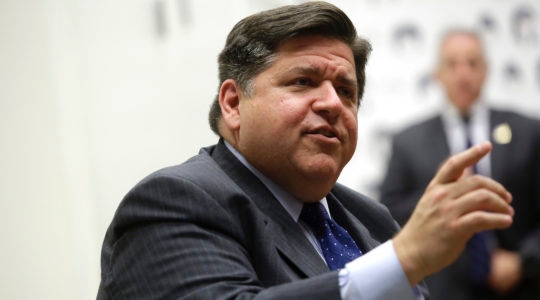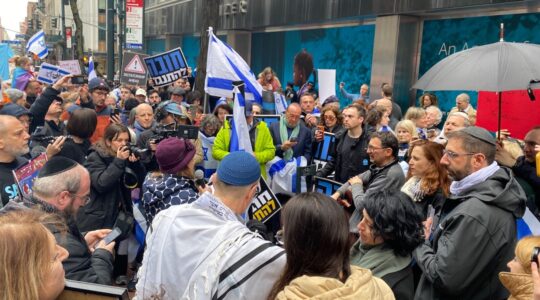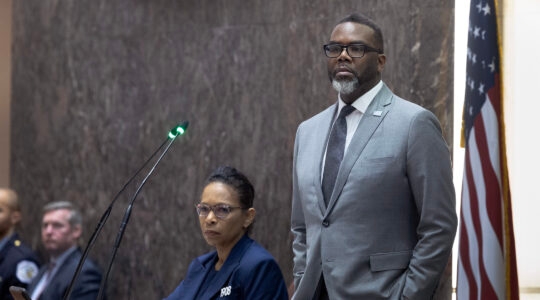WASHINGTON (JTA) – U.S. officials involved in helping train Palestinian security forces are pressing for more cash at a time when Congress is imposing greater oversight over spending on the Palestinians.
A senior Western official involved in the training of the Palestinian security forces loyal to Mahmoud Abbas, the relatively moderate Palestinian Authority president, met recently with the JTA and touted the advances made in the training.
The official said the $86 million allocated last year by the Bush administration has nearly been spent and that the program’s viability will depend on another $25 million now in the pipeline.
The United States and Israel see the development of a reliable force as critical to ensuring public order and, more substantively, to protecting Israel from terrorist attacks. A mature Palestinian security infrastructure might have filled in the gaps in Israeli intelligence that failed to anticipate last week’s terrorist attack on a Jerusalem yeshiva that left eight students dead.
Underscoring the vulnerability of funding for the Palestinian Authority funds was U.S. Rep. Nita Lowey (D-N.Y.) placing a hold last week on another $150 million in direct assistance to the Palestinian Authority.
Lowey told JTA she backed the goals of the training but first wanted to be apprised of its success in preparing the forces to face down Hamas terrorists and maintain order.
“It is important for all parties to maintain their commitment to the peace process and prevent terrorist forces from derailing the long-term peace efforts,” Lowey, the powerful chairwoman of the U.S. House of Representatives’ Foreign Operations Appropriations subcommittee, said in an e-mail.
“I am reviewing the administration’s request for additional funding to support training for the Palestinian security forces in the context of what has been achieved to date.”
The $25 million needed for the training comes from about $350 million that is project based and does not go directly to the Palestinian Authority, unlike the $150 million in direct assistance that Lowey froze last week. That hold was motivated partly out of anger with the Bush administration.
Congress has traditionally opposed direct transfers to the Palestinian Authority, worried that the money would disappear as it has in the past into a corruption hole or find its way into terrorists’ hands.
However, Congress was swayed last year by the administration’s confidence in the transparency of Abbas’ new prime minister, Salam Fayyad, and allocated the $150 million with a caveat: Any transfer of more than $100 million needed to undergo oversight.
President Bush waived such restrictions, saying the Palestinian Authority needed the funds now to leverage loans. The Palestinian Authority argues that it needs to shore up support in its efforts to confront extremists and forge ahead with renewed peace talks with Israel.
That did not convince Lowey, a Jewish lawmaker whose pre-political experience included senior executive positions in Jewish women’s groups.
Perhaps more ominously for the prospects of P.A. finances, Lowey was struck as well by a recent interview in which Abbas would not dismiss a return to armed resistance as a means of achieving Palestinian statehood.
The U.S. Agency for International Development, which administers most P.A.-earmarked funds, and the State Department “have not met my requests for information regarding funding to the Palestinian Authority, and President Abbas’ recent statements cast doubt on his willingness to take the steps necessary for peace with Israel,” she said in calling for the hold.
This week, Lowey lifted her hold on $100 million of the direct aid, but maintained the hold on the remaining $50 million, forcing the Bush administration to hew to the letter of the legislation.
Addressing U.S. Secretary of State Condoleezza Rice, who testified Wednesday before Lowey’s committee on her budget requests, Lowey said material she had received from the State Department had satisfied her concerns about transparency, but she was still concerned about Abbas’ motives.
“I have since received a copy of the draft memorandum of agreement and your assurance that the Palestinian leadership is committed to peace with Israel,” Lowey said. “While I must say I remain skeptical about the political will of the Palestinian leadership that all too often lapses into inflammatory rhetoric that belies their stated commitment to peace, I want no one to doubt the commitment of the United States to pursue peace when Prime Minister Olmert and President Abbas have once again publicly affirmed their commitment to the peace process.”
Echoing Lowey’s concerns was U.S. Rep. Ileana Ros-Lehtinen (R-Fla.), the ranking member of the House Foreign Affairs committee, who also called for a hold. Ros-Lehtinen suggested that Abbas had violated U.S. standards of endorsement.
“Statements by Mr. Abbas clearly violate, at minimum, the spirit of U.S. law regarding such hateful rhetoric,” she said.
Those backing funding for security training are frustrated by the fact that the rhetoric and hold come at a time when they say the program is finally showing gains.
The Western official, who asked not to be identified, showed JTA photos of the training camp in Jordan in which the P alestinian troops are marching in formation and training in riot control, human rights and effective arrests, and defensive shooting.
The official said morale was high among the troops, who are learning teamwork and working under a single command.
The first class of about 1,100 fighters will not be deployed in the West Bank until June. Congress earmarked $59 million in funds for the training last year, but the sum increased to $86 million by the time training started in earnest last fall.
The training is three-pronged: training the fighters, creating a strategic planning unit and refurbishing facilities in the West Bank so the Palestinians can train themselves. U.S. officials draw up the training programs, but other nations – including Jordan, Egypt and European nations – supply the trainers and the arms.
Israel helps to facilitate the training, principally by easing the passage to Jordan for the fighters.
There is sympathy in Congress for the goals of the program, and lawmakers at times appear to be torn. On the same day that Ros-Lehtinen accused Abbas of hatemongering, she met with Jordan’s King Abdullah and thanked him for training P.A. fighters who would be loyal to Abbas.
The question is whether such training will prove its worth.
Lt. Gen. Keith Dayton, the American running the program, testified to Congress last summer that the troops were ready to handle emerging unrest in the Gaza Strip. Within weeks Hamas forces had forced troops loyal to Abbas to flee Gaza and assumed control of the area.
Dayton is one of the central figures in a Vanity Fair story this month alleging that the goal of funding for Palestinian security was a bid to foment a civil war with Hamas, which ultimately backfired.
While Rice has called the story “ludicrous,” it has generated concerns on Capitol Hill and in the State Department that a security force is not now viable.
The object of the program, the Western official told JTA, is to incrementally build a force that would make the Fayyad-Abbas government credible in its quest for peace with Israel.
Already, the official said, Fayyad’s policies have rejuvenated Nablus, a northern West Bank city known for its chaos. The town is quiet, with stores and coffee shops staying open late, the official said.
Still, the official said, the program should not be rushed. Talk in Egypt and Europe of the troops assuming control of the crossings with Gaza was premature.
JTA has documented Jewish history in real-time for over a century. Keep our journalism strong by joining us in supporting independent, award-winning reporting.





